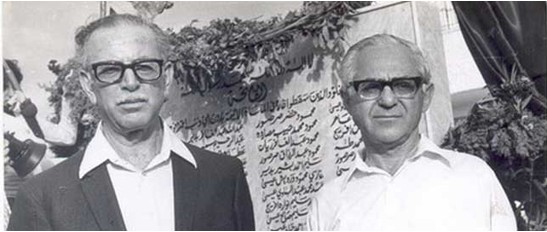Declassified documents have revealed fresh details on the planned murder of Palestinian civilians during the Kafr Qasem massacre, when an Israeli commander advised troops that “it was desirable for there to be a number of fatalities.”

Communist Knesset Members Tawfik Toubi and Meir Vilner in Kafr Qasem near the memorial of the victims during the 20th anniversary of the Kafr Qasem massacre (Photo: Al Ittihad)
Fifty Arab-Palestinian civilians, Israeli citizens, including children, elderly residents and a pregnant woman, were killed by Israeli troops as they returned home from work. They had no knowledge the village had been placed under curfew. The transcripts have been revealed to the public on Friday by the Defense Ministry following an appeal by historian Adam Raz of the Akevot Institute for Israeli-Palestinian Conflict Research. The state initially refused to release the transcripts, claiming their content “could jeopardize national security.”
News of the massacre leaked out almost immediately. However, it took two months of lobbying by Communist Knesset Members Tawfik Toubi and Meir Vilner and members of the press (from Kol Ha’am, Al Ittihad and Haolam Haze newspapers) before the government lifted the media blackout imposed by then Prime Minister David Ben-Gurion. To limit publicity, a military cordon was maintained around the village for months, preventing journalists from approaching.
The release of the report was welcomed by Hadash lawmakers. “Today what we said from the first day was revealed: the shocking massacre in Kafr Qasem in 1956 was a deliberate murder, part of a plan to deport the residents of the Triangle,” Joint List MK Aida Touma-Suleiman (Hadash) said.
“The published protocols prove that Israel not only murdered 50 Arab citizens in cold blood but also planned the ‘establishment of pens’ and the ‘transfer of the people,’ not only in 1948 but also under the military regime in the 1950s.”
“The State of Israel must officially acknowledge its responsibility for the massacre. Acknowledging the crimes of the past is a necessary step on the way to correcting the historical injustice and the basis for a common future,” added Touma-Suleiman.
According to the trial transcripts of Chaim Levy, who commanded the Israeli army in Kafr Qasem, the troops knew their victims were unarmed civilians who had not been informed about the curfew. “The same goes for them as anyone else,” Levy said he was told by a commander, regarding the civilians. In one exchange during his trial, Levy was asked: “Doesn’t your reason tell you that ‘violating a curfew’ means by someone who knows that there is a curfew?” Levy said he agreed. Later he was asked: “How can you say that someone told you to kill people who don’t know that there is a curfew?” To which he replied: “Because I was given such an order… Today I find this unreasonable. At the time, I thought it was reasonable.”
The documents also reveal a new link between the massacre and a secret Israeli plan, code-named Hafarperet (Mole), to deport Palestinians of the Little Triangle area in central Israel to Jordan. Levy’s testimony offers a detailed account of how Israeli officers appear to have used tensions during the Suez crisis to orchestrate the removal of Palestinians from their villages.
Levy refers to plans of “creating enclosures” and “transporting people,” which could be interpreted to mean the detention of Palestinians in camps or expulsion from their homeland. He also said he was informed by his commander not to station troops along the village’s eastern border facing Jordan, in an effort to push fleeing Palestinians out of Israel. “I understood that it would be no great calamity if they took this opportunity to go away,” he said.
Levy said he understood there was a direct link between shooting curfew violators and changing Israel’s demographic makeup.
“The connection is that as a result, part of the population would get scared and decide that it’s best to live on the other side. That’s how I interpret it,” he said.
Casualties were ‘desirable’ The testimony of district commander Issachar Shadmi appeared to corroborate Levy’s understanding of the massacre. Shadmi said it was no secret Israel “heavily encouraged” Palestinians to leave its borders. “The killing of a few people as an intimidation measure can encourage movement eastward, as long as we hint to them [the Palestinians] about the movement eastward,” he said.
Related: https://maki.org.il/en/?p=29559


